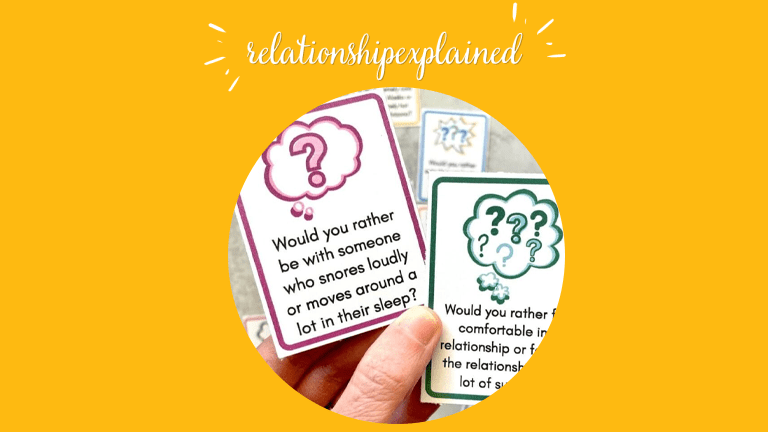Relationship Myths
Are you navigating the complex world of romantic relationships and finding yourself tripped up by common myths? You're not alone. Many of us have been led to believe certain "truths" about relationships that, upon closer examination, don't hold up. These myths can not only skew our expectations but can also negatively impact our approach to […]
Are you navigating the complex world of romantic relationships and finding yourself tripped up by common myths?
You're not alone. Many of us have been led to believe certain "truths" about relationships that, upon closer examination, don't hold up. These myths can not only skew our expectations but can also negatively impact our approach to love and partnership. In this article, we'll debunk some of these widespread relationship myths, shedding light on the realities of building and maintaining healthy connections.
Well, we'll be going over:
- What are some widely accepted relationship myths that might be steering you wrong?
- How do these myths contrast with the realities of healthy relationships?
- What steps can you take to cultivate a relationship that thrives beyond these myths?
Let's dive in.
Key Takeaways
- Relationship myths are beliefs about romantic relationships that are not necessarily based on fact.
- Debunking common relationship myths can lead to a better understanding of what makes a healthy relationship.
- Relationship myths can have a negative impact on our mental health, but building healthy relationships beyond these myths is possible.
Understanding Relationship Myths
Relationships are complex and multifaceted, and it's no surprise that a lot of myths and misconceptions have arisen around them. These myths can be harmful, leading people to have unrealistic expectations and to make poor decisions in their relationships. In this section, we'll explore some of the most common relationship myths and where they come from.
Media Influence on Relationship Myths
One of the biggest sources of relationship myths is the media. Movies, television shows, and books often portray unrealistic and unhealthy relationships, which can distort people's perceptions of what a healthy relationship looks like. For example, the idea of "love at first sight" is a common trope in romantic movies, but it's not a realistic expectation for most people.
Psychology Behind Relationship Myths
There are also psychological reasons why people believe in relationship myths. For example, people often have unrealistic expectations about their partners, which can lead to disappointment and frustration. Additionally, people may cling to myths because they provide a sense of security and certainty in an uncertain world.
Cultural Influence on Relationship Myths
Finally, cultural factors can play a role in shaping relationship myths. Different cultures have different expectations and norms around relationships, and these can influence people's beliefs and behaviors. For example, in some cultures, it's considered normal for men to be dominant and women to be submissive in relationships, while in other cultures, equality and mutual respect are emphasized.
By understanding the sources of relationship myths, you can begin to question and challenge them. This can help you develop more realistic expectations and make better decisions in your relationships. Remember that relationships are complex and unique, and there is no one-size-fits-all approach. Communication, mutual respect, and empathy are key to building healthy and fulfilling relationships.
Debunking Common Relationship Myths
When it comes to relationships, there are many myths and misconceptions that people believe. These myths can cause unnecessary stress and confusion, and can even lead to the end of a relationship. In this section, we will debunk some of the most common relationship myths.
Myths About Love and Romance
One of the biggest myths about love and romance is that there is such a thing as "true love" or a "spark" that will last forever. While it is true that there can be a strong initial attraction or infatuation, the reality is that a long-lasting relationship requires much more than just passion and romance. It requires commitment, support, and hard work.
Another common myth is that if you are truly in love, you will never have any challenges or disagreements. The truth is that all relationships have their ups and downs, and it is how you handle these challenges that will determine the success of your relationship. It is important to communicate openly and honestly with your partner, and to be willing to work through any differences or conflicts that may arise.
Myths About Conflict and Resolution
One of the most damaging myths about conflict and resolution is that fighting is a sign of an unhealthy relationship. The truth is that disagreements and fights are a normal part of any relationship, and can even be healthy if they are resolved in a constructive way. It is important to learn how to communicate effectively, and to work together to find solutions that work for both partners.
Another common myth is that if you are unhappy in your relationship, you should just end it. While there may be situations where ending a relationship is the best option, it is important to remember that all relationships have their challenges. It is important to seek support and advice from trusted friends or professionals before making any major decisions.
Myths About Compatibility and Commitment
One of the biggest myths about compatibility and commitment is that you need to have everything in common in order to have a successful relationship. While it is important to share some common interests and values, it is also important to embrace your differences and to be willing to compromise. It is possible to have a successful relationship even if you have different hobbies, beliefs, or backgrounds.
Another common myth is that if you are committed to your relationship, you will never consider divorce. The truth is that divorce is a reality for many couples, and it is important to be prepared for the possibility. It is important to seek relationship advice and support if you are struggling, and to be willing to work through any challenges that may arise.
In conclusion, it is important to be aware of the common relationship myths and misconceptions, and to approach your relationship with a realistic and open-minded attitude. By communicating openly and honestly with your partner, seeking support and advice when needed, and being willing to work through any challenges that may arise, you can build a strong and healthy relationship that will stand the test of time.
Impact of Relationship Myths on Mental Health
Relationship myths are beliefs that people hold about romantic relationships that are not necessarily true. These myths can be harmful to mental health and can lead to unhappy relationships. Here are some of the ways that relationship myths can impact mental health:
Anxiety and Doubt
One common relationship myth is that if your partner truly loves you, they will know what you need without you having to ask. This can lead to anxiety and doubt if your partner does not seem to understand your needs. It is important to communicate with your partner and not rely on this myth.
Jealousy and Insecurity
Another relationship myth is that jealousy is a sign of love. This can lead to insecurity and jealousy, which can be harmful to mental health. It is important to trust your partner and not let jealousy take over your relationship.
Addiction and Destructive Habits
Some people believe that their partner is responsible for their happiness and that they cannot be happy without them. This can lead to addiction and destructive habits, such as staying in a relationship that is not healthy. It is important to take responsibility for your own happiness and not rely on your partner to make you happy.
Overall, relationship myths can be harmful to mental health and can lead to unhappy relationships. It is important to recognize these myths and communicate openly with your partner to build a healthy and happy relationship.
Building Healthy Relationships Beyond Myths
When it comes to building healthy relationships, there are many myths that can get in the way of success. By understanding and dispelling these myths, you can create a strong foundation for a successful and happy relationship.
Effective Communication and Understanding
One of the most important aspects of a healthy relationship is effective communication. This means not only speaking your mind but also actively listening to your partner. When you communicate effectively, you can avoid misunderstandings and build trust. It's also important to understand your partner's perspective and be willing to compromise.
Respect and Fairness
Respect and fairness are key components of a successful relationship. This means treating your partner with kindness and consideration, even when you disagree. It's also important to be fair and equitable in your relationship, sharing responsibilities and decision-making equally.
Balance and Happiness
Achieving balance and happiness in a relationship requires effort from both partners. This means making time for each other, pursuing shared interests, and supporting each other's goals and aspirations. It's also important to prioritize your relationship and make it a priority in your life.
By following these principles and avoiding common relationship myths, you can build a strong and successful relationship that brings happiness and fulfillment to both partners. Remember, a healthy relationship takes work, but the rewards are well worth the effort.
Frequently Asked Questions
What are some common relationship myths that people believe?
There are several common relationship myths that people believe. These include the belief that love is enough to sustain a relationship, the idea that a perfect relationship exists, and the notion that your partner should complete you. However, these myths are not accurate and can lead to unrealistic expectations and disappointment.
What are some bad relationship myths that can actually harm a relationship?
Some relationship myths can do more harm than good. For example, the belief that jealousy is a sign of love can lead to controlling behavior and damage trust in a relationship. Another myth is that fighting is always a bad thing. In reality, conflict is a natural part of any relationship and can actually be healthy if handled in a constructive way.
What are some false beliefs about relationships that people often have?
People often have false beliefs about relationships, such as the idea that relationships should be easy and effortless. In reality, relationships require work and effort from both partners. Another false belief is that your partner should always know what you're thinking and feeling without you having to communicate it. This can lead to misunderstandings and resentment.
What are some dating myths that don't reflect reality?
There are several dating myths that don't reflect reality. One is the belief that playing hard to get will make someone more interested in you. In reality, this can come across as disinterest or game-playing. Another myth is that opposites attract. While some differences can be complementary, having too many differences can lead to conflict and incompatibility.
What are some ancient myths about love that people still believe?
There are several ancient myths about love that people still believe, such as the idea that love at first sight is real. In reality, attraction at first sight is possible, but love requires time and effort to develop. Another myth is that true love conquers all. While love is important in a relationship, it cannot solve all problems.
How can you tell if you're not happy in a relationship?
If you're not happy in a relationship, you may feel unhappy, unfulfilled, and disconnected from your partner. You may also feel like you're walking on eggshells around them or like your needs are not being met. If you're unsure if you're happy in your relationship, it's important to communicate with your partner and seek support from a therapist or trusted friend.












